 Business Solutions
, Customer Engagement
Business Solutions
, Customer Engagement

25 April, 2024

Sentiment analysis tools work like detectives for your business. They help determine how people feel about your brand, product, or service. Aside from reading minds, you’ll get the whole picture of what people say online. These tools also highlight areas where you can improve and point out messages that need urgent attention.
However, there are so many sentiment analysis tools out there that choosing the right one can be confusing. This comprehensive article will provide information about the 18 best sentiment analysis tools for different purposes, such as social listening, customer sentiments, or free tools.
Also, you’ll get an overview of sentiment analysis, the benefits of using these tools, and, most importantly, finding the right tool for your business.
Contents
Sentiment analysis is a process of conversation research. It uses NLP and ML to report on customer emotions. Other names for it are opinion mining, text analysis, and emotion AI.
Tools for sentiment analysis examine the emotions in text or audio/visual messages. They determine if the content is positive, negative, or neutral.
These tools track reviews, feedback, surveys, and customer support chats online. They search for emotional keywords and analyze data. Then, they present the information in charts or graphs to show customer feedback and opinions about the business.
Here is an example text from Amazon and its sentiment analysis result.
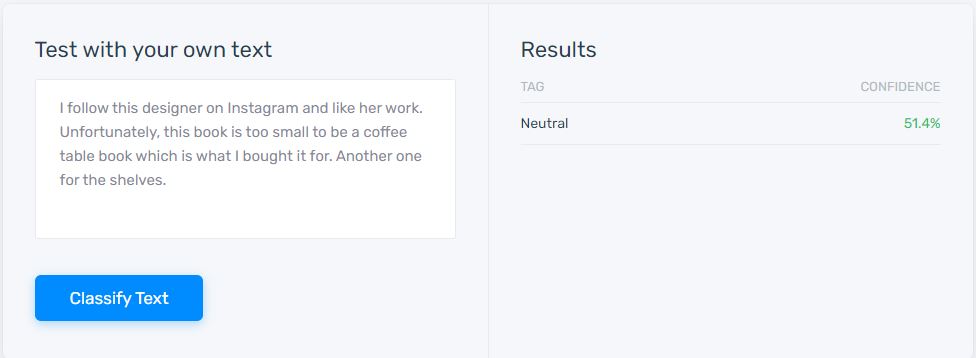
Thousands of tweets, comments, and text messages are posted online every minute. With AI technology, you can handle this massive amount of content. Well, that’s where sentiment analysis tools come in. They make it easier to process feedback and understand emotions without manual effort.
By 2025, most data (around 8 out of 10) will be unstructured, which means companies will face challenges in interpreting it.- Source
Here are the key benefits of sentiment analysis tools.
These tools turn text data into valuable insights about customer opinions. You can address concerns and improve your service based on this feedback.
Sentiment analysis tools help find influencers and monitor discussions about the brand online. Consequently, you can improve your product or service and online reputation.
Integrating sentiment analysis with customer support software lets you get real-time customer feedback. Based on sentiment, you can prioritize urgent or negative issues to solve and improve customer satisfaction.
It provides data on customer preferences, sentiments, and trends. These insights help with market research, identify opportunities, and stay ahead in the marketplace.
Manual reading and analyzing numerous comments is time-consuming. These tools automatically scan and analyze social media texts and save time from manual reading and labeling of sentiment marks.
When choosing software, we usually regard price, integration, devices, customization, support, and documentation. In addition to these, there are three key features to consider when selecting a sentiment analysis tool.
Select a sentiment analysis tool that covers a wide range of sources, especially where your audience is active. More platform coverage means more data, providing a comprehensive overview of brand sentiment.
Look for a tool that understands nuanced language beyond simple expressions, such as “I am happy” or “I disliked it.” Customers don’t always express themselves clearly, so choose a tool that grasps subtleties in feedback and complex expressions.
A tool with real-time analytics will help you stay current with the conversations. It helps address negative comments swiftly, ensuring an excellent customer experience and protecting your brand reputation.
If you want a complete sentiment analysis tool with robust and diverse features, here are 5 tools to consider. These tools track customer feedback, give customer and employee insights, manage reputations online, analyze social sentiment, and more. Also, it shows CSAT, NPS, and CES.
Let’s delve into the list of 5 best sentiment analysis tools.
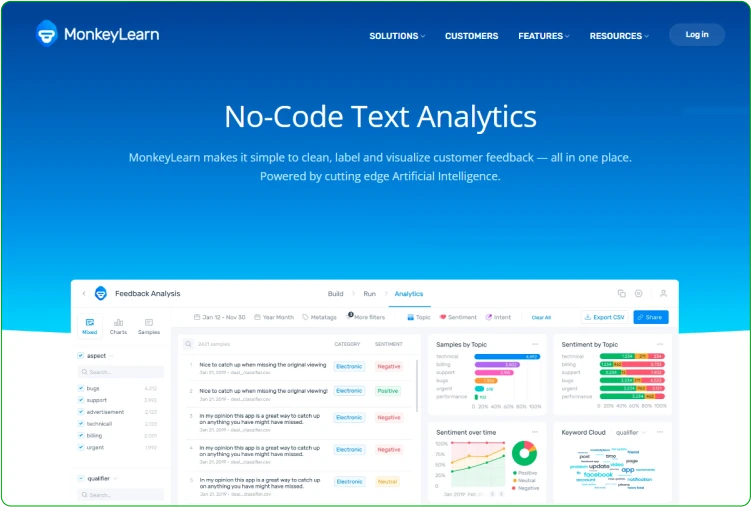
A user-friendly and complete text analysis and data visualization tool for enterprises. It allows the analysis of unstructured data with NLP. MonkeyLearn offers flexibility in customizing classifiers and extractors for text analysis.
What’s great is that you can use its pre-built machine learning model or build your own without writing code. Its API allows you to develop your sentiment analysis models and streamline analysis.
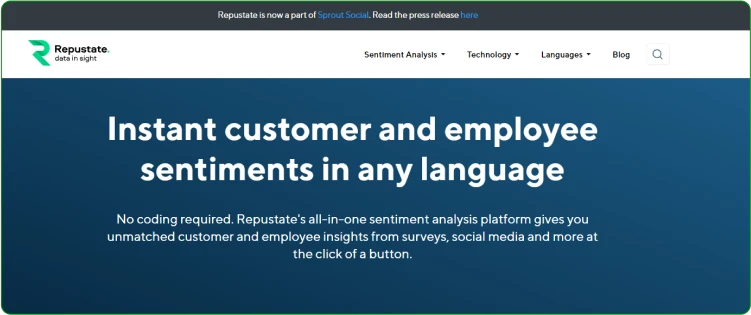
It’s a tool that gives customer and employee insights to help businesses improve customer experience and employee retention.
Repustate caters to a wide range of industries, including healthcare, automotive, finance, and more. This AI-powered platform does more than sentiment analysis. It also provides Business Intelligence, Brand Insights, Reputation Management, and other features.
These help businesses gain insights and make better decisions to improve service and satisfaction. The best part is that Repustate analyzes multiple content formats – text, audio, video, image, and emoji.
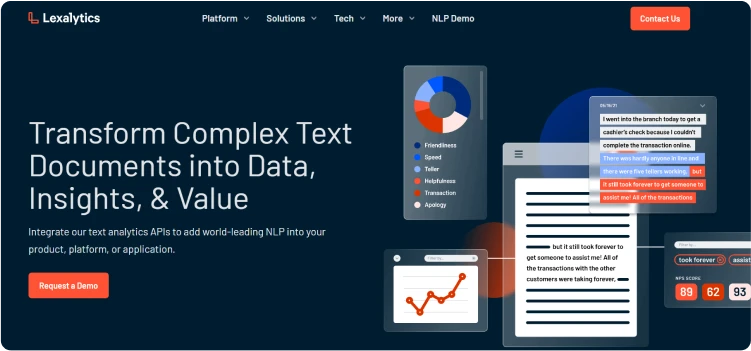
This sentiment analysis tool is suitable for all kinds of business purposes. Lexalytics uses Natural Language Processing (NLP) to analyze sentiment and determine the intent of the customers’ messages.
Its document summarization feature summarizes lengthy documents and extracts the most relevant sentences. This feature allows busy professionals to grasp the main ideas quickly without delving into the entire document.
As most sentiment analysis tools answer ‘how’ they feel, Lexalytics tells you why customers feel negative or positive. This feature differentiates it from other tools.
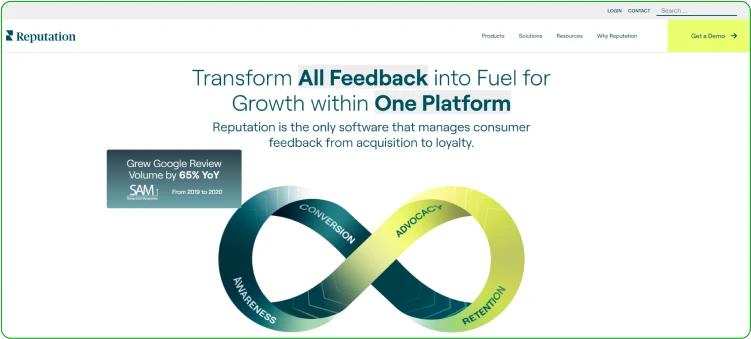
If you are looking for a platform to track customer feedback while growing your reputation online, Reputation is the right tool. From acquisition to feedback, it manages customer feedback and provides reports on customer sentiment.
This tool lets you learn competitors’ performance and identify new opportunities. Additionally, you can boost your search ranking, handle local SEO, manage all business listings, and analyze customer experience and social sentiment from a single platform.
It provides online reputation management solutions to multiple industries – Automotive, Healthcare, Property Management, Restaurants and Hospitality, Retail, Senior Care and Financial Services.
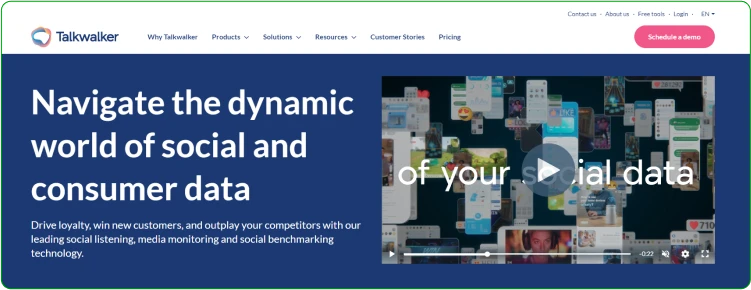
A consumer intelligence platform that offers a complete solution for a 360-degree view of consumers. In Talkwalker, you’ll get five products in one platform – social listening, media monitoring, audience insights, customer feedback analysis, and social benchmarking.
You can track campaign performance, hashtags, mentions, and competitors’ performance with this tool. Also, identify industry influencers, discover trending topics, and learn the voice of your consumers.
One of its standout features is Blue Silk GPT, which covers extensive social networks to collect and analyze data. In addition, it works beyond Boolean queries and allows you to search, classify, and segment data in plain languages.
When choosing sentiment analysis tools for social media, we prefer tools that monitor and track mentions, hashtags, keywords, comments, and brand names on social media and other online platforms.
In addition, data source, language detection, competitor monitoring, reporting, and analytics are essential features to look for when choosing a social media sentiment analysis tool.
Here are five tools selected based on these factors.
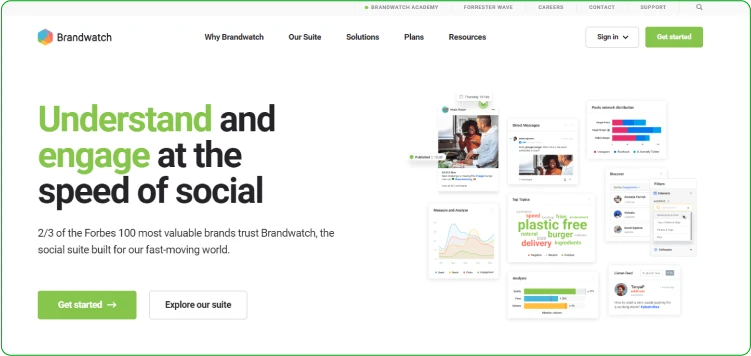
A social suite built for a fast-moving world. With Brandwatch, you can discover new trends, monitor threats before it’s too late, and take action to improve brand engagement. Its Social Media Management suite allows social listening and compares performance with competitors.
You can publish content, create ads, engage the audience, measure performance, and see audience data from one platform. Its social listening technology will help you monitor hashtags and mentions and find emotions behind the conversations.
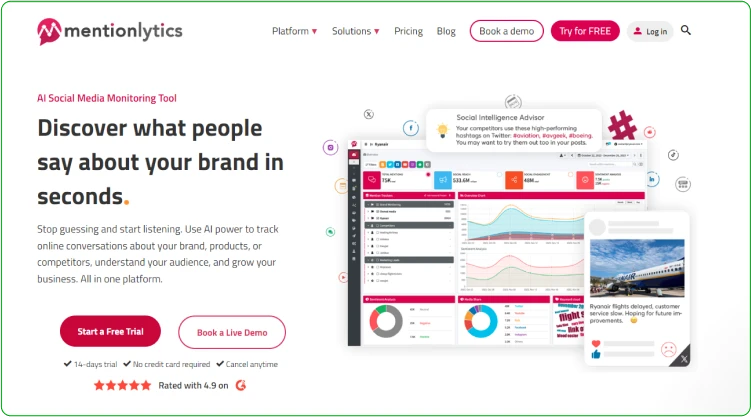
Want to analyze social media sentiment while monitoring and publishing content from one platform? Mentionlytics can be the right solution for you. This intelligent social media monitoring tool helps businesses track mentions, find influencers, and grow sales and brand reputation.
You can track social media and web conversations and learn about your customer’s opinions, behaviors, and feelings. The best part is that Social Intelligence Advisor (SIA) will give you personalized advice on social media strategy.

This social listening tool offers reputation management, social selling and customer service, influencer marketing, competitor analysis, and market research features. With Awario, you can find and join social conversations and get real-time social insights.
It tracks social mentions on social media, blogs, videos, forums, news, and reviews. This tool will help you measure brand sentiment, prioritize negative mentions to respond first, track reactions to marketing campaigns, and know competitors’ performance.
Thus, you can stay on top of all positive and negative brand mentions. In addition, you can generate reports through graphs and word clouds.
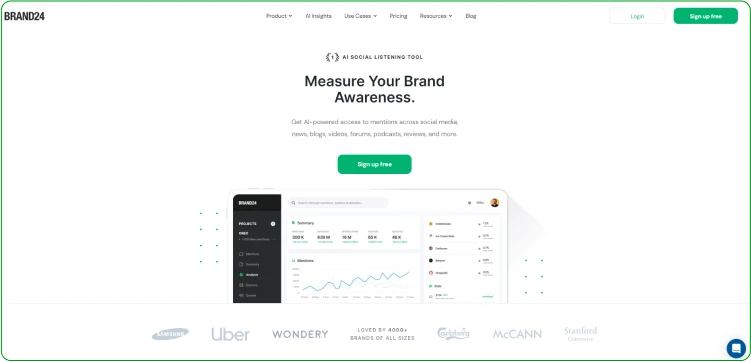
An AI-powered social listening tool that monitors web and social media texts, mentions, and hashtags. Its sentiment analysis algorithm collects all mentions and posts from most social media platforms and web sources.
Then, the tool segments the conversations into positive, negative, or neutral sentiments and provides a detailed emotional analysis. What’s great is that you’ll get actionable insights and AI-powered personalized recommendations for brand growth.
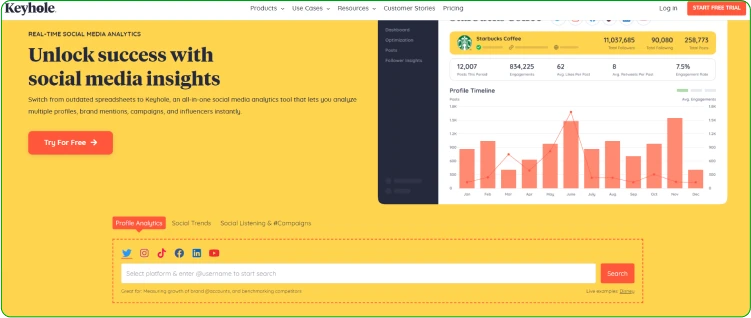
Another social media sentiment analysis tool that allows businesses to get social media insights and analyze sentiment in real time. You can research the market, track influencers, compare competitors’ performance, publish posts, and analyze trends. This tool offers solutions to various industries and different-sized businesses – from individual to enterprise.
The best part is that Keyhole provides solutions for campaign and event monitoring. In addition, it has a free Engagement Rate Calculator for Instagram.
Want to know how your customers feel about the brand? Customer sentiment analysis tools will help you know that by analyzing customer conversations found in reviews, surveys, and support tickets. Some typical features of these tools are customer feedback analysis, support ticket prioritization, CSAT and NPS analysis, auto-routing, and the voice of customers.
Here are the five best tools for customer sentiment analysis. You can select one based on your business needs.
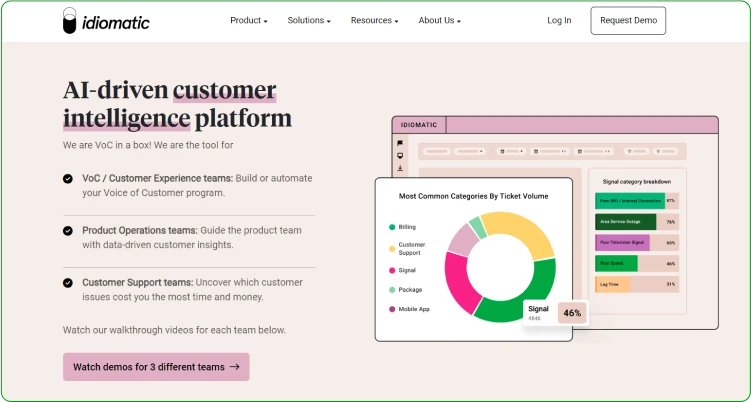
An ideal solution for customer-focused companies. This AI-based customer intelligence platform allows companies to build VoC from scratch, automate existing VoC processes, and evaluate chatbot performance.
The tool collects data from a wide variety of sources, such as phone calls, emails, chats, social media, app reviews, survey responses, and NPS/CSAT. Idiomatic offers contextual ML and gives specific insights to help you turn customer feedback into action and improve customer experience.
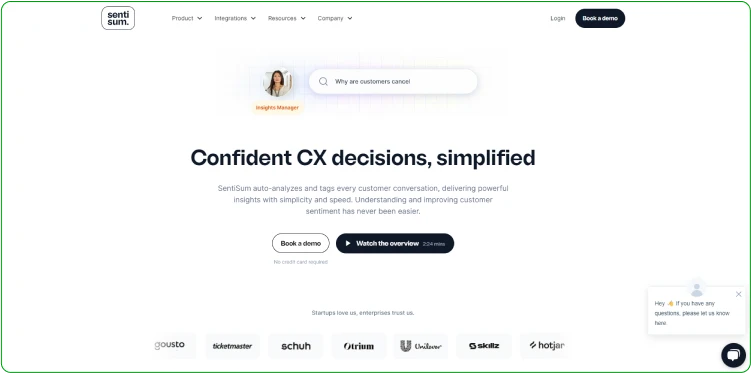
Want to analyze CSAT, customer feedback, support tickets, and surveys? Sentisum is the right tool to get the voice of the customer insights and improve customer experience. Its powerful AI technology tags every customer conversation in emails, phone calls, chats, surveys, and reviews.
The real-time analysis feature auto-prioritizes queries based on sentiment and urgency. And the best part is that Sentisum automatically turns reviews and comments into support queries.
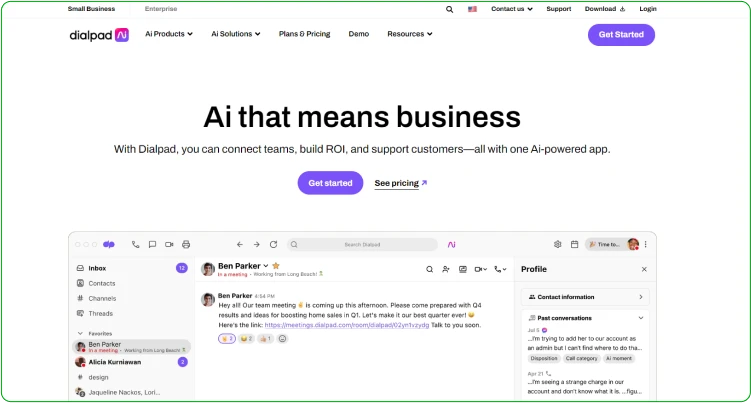
Looking for a platform to analyze customer sentiment while managing sales and support? Dialpad is the right one for you. This AI-powered customer intelligence platform offers a comprehensive suite for small to large businesses.
Using this tool, you can streamline your business communication by setting up an AI contact center and AI-powered workspace. What’s nice is that Dialpad automatically transcribes voice calls and provides live sentiment analysis. Consequently, you can take steps to improve customer relationships.
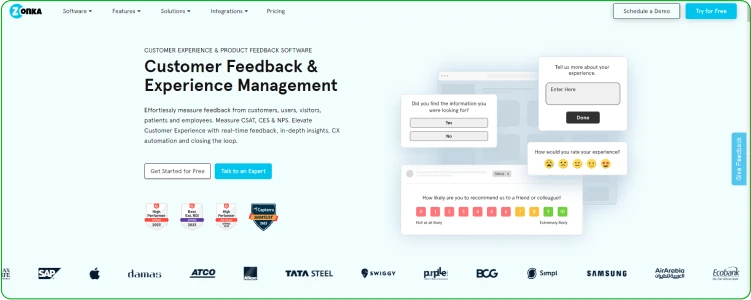
It is a customer feedback and survey platform that measures key customer insights (CSAT, NPS, and CES) and helps businesses improve customer experience.
With Zonka Feedback, you create surveys and feedback forms and capture data from multiple sources – including SMS and offline. Aside from CX Matrix, this tool allows adding tags to responses, creating tasks from teams, and labeling tasks as urgent.
Thus, you can close the feedback loop and prevent churn. The standout feature is taking feedback via the Offline Survey App and Kiosks.
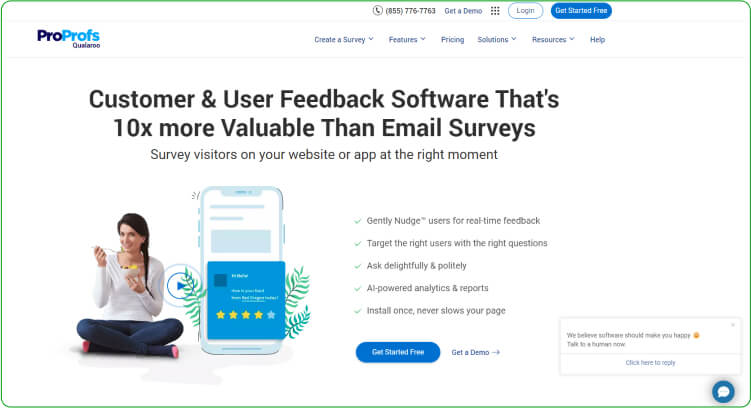
A user research and customer feedback software that allows businesses to survey visitors and get actionable user insights. Its sentiment analysis tool is powered by IBM Watson, which means faster and more comprehensive analytics.
Qualaroo tool allows you to build a site feedback engine to monitor user intent and satisfaction. You’ll get user feedback on websites, apps, and products by installing a code; you only need to install it once. Its standout feature is the Nudge technology, which asks the right questions to users at the right time.
Want instant insight? Using a free tool is a great way to familiarize yourself with the technology. Although free tools do not offer robust features, they are suitable for instant and limited data analysis.
Here are three free sentiment analysis tools listed.
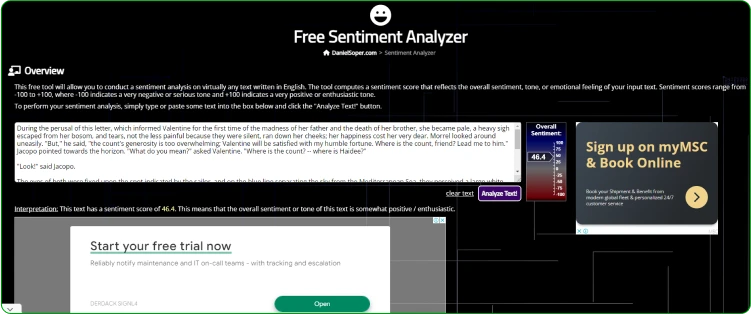
This free tool serves the primary function of sentiment analysis. It gives a sentiment score from -100 (super serious or negative) to +100 (cheerful). This free Sentiment Analyzer uses computational linguistics and text mining to define the emotions behind any text written in English.
This analyzer was trained with 8000+ writing samples and conversation transcripts. The tool is easy to use. Just write or copy text from anywhere, paste the texts here, click the ‘Analyze’ button, and you’ll get a score.
According to SentiStrength, the tool analyzes 16,000 social web texts per second and provides human-level accuracy in English. It is available in other languages, and you can add yours. This automatic sentiment analysis tool uses two scores for reporting sentiment strength: (-1 to -5) and (1 to 5). What’s great is that the tool shows binary, trinary, and single-scale results.
However, the free version supports Windows only, and it is for academic research. For commercial purposes, you must buy a license to access the Java version.
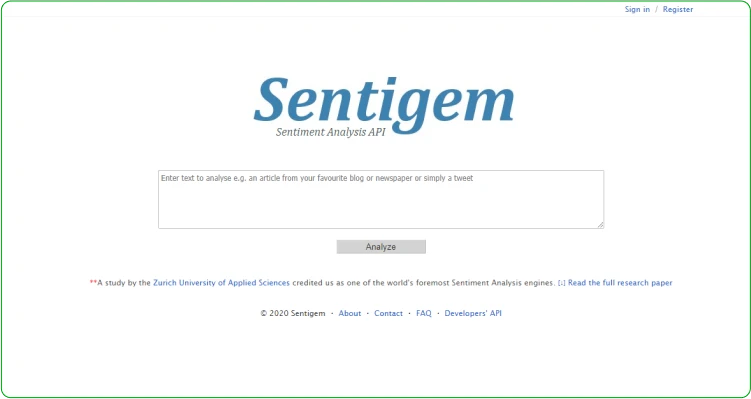
It is another free tool to analyze the sentiment of a piece of text. The tool is easy to use, like the Sentiment Analyzer. All you need to do is write or paste texts in the box and press the Analyze button. You’re done. Instead of a numeric scale, it shows results in three sentiments – positive, negative, and neutral.
If you are looking for a free sentiment analysis API, you can get it from here. To get the API key, you must register and activate your account in the Sentinel.
However, some paid software offers free plans with limited features. A few of them are:
Using a sentiment analysis tool is an effective way to learn about brand reputation and customers’ emotions from a high volume of unstructured data and conversation. However, you should select the right tool based on your business type, size, and needs.
The tool designed for customer sentiment analysis may not serve your purpose if you want to track and analyze social mentions and hashtags.
Hence, it is recommended that you use the trial version of your desired software before subscribing to a paid plan.